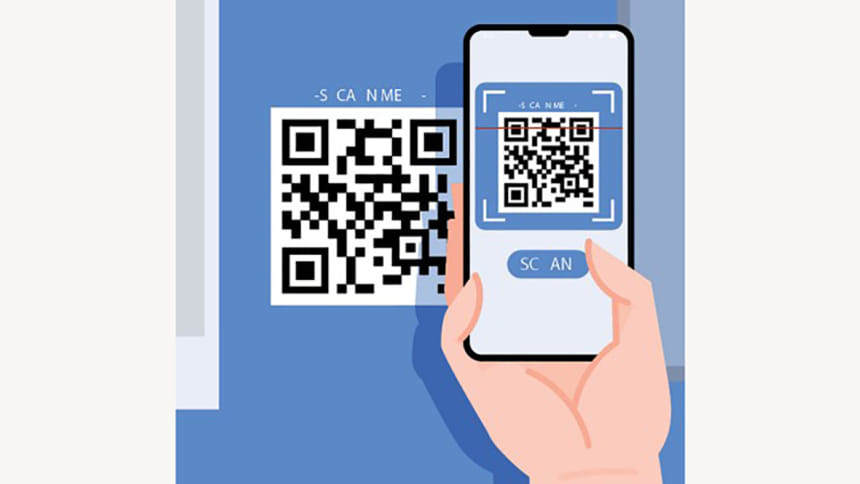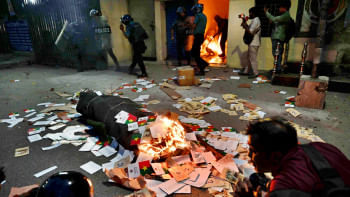BB moves to boost cashless transactions

Bangladesh Bank yesterday rolled out an interoperable QR code as a part of its efforts to boost cashless transactions across the country, particularly in rural areas.
The uniform digital payment method named 'Bangla QR', will help clients pay their bills for purchased goods and services through any mobile banking application, mobile financial service (MFS) or payment service provider (PSP).
"This is a great move taken by the central bank to push cashless transactions in the country," industry insiders said.
The central bank's initiative came at a time when a growing number of population have started preferring to do transactions digitally because of convenience.
And the pandemic has given a further push to cashless transaction as people from all walks of life are increasingly embracing the different digital financial payment tools to avoid cash in order to keep the coronavirus at bay. For instance, transaction through MFS rose 41 per cent year-on-year to Tk 53,259 crore in October last year.
The issuance of credit cards stood at 16.31 lakh as of October, up 8.73 per cent year-on-year, when debit cards grew 8.70 per cent to 2.10 crore.
The new digital payment method will quickly gain popularity in the remote area as the central bank relaxed the rules for opening personal retail accounts for micro and underprivileged businesses on November 16. Clients will be encouraged to use the QR code as well.
For instance, clients are now allowed to pay shopping bills through a QR code if there is an agreement between the outlet and the entity that holds the customer account. However, the latest move will help the account holder of any bank, MFS or PSP to make the payment if Bangla QR is available at an outlet, according to a central bank notice.
A quick response (QR) code is a type of barcode that stores information as a series of pixels in a square grid and can easily be read by smartphones.
Clients will have to scan the code with their smartphones to make payments for products purchased from the stall.
Some banks and MFS have already introduced QR codes for the expansion of their businesses but they will have to replace their existing digital payment system with Bangla QR by December this year in order establish the interoperable method.
"This is a revolutionary measure beyond a doubt," said Md Arfan Ali, managing director of Bank Asia.
Bangladesh Bank had earlier introduced personal retail accounts for micro and underprivileged businesses, which will give a boost to Bangla QR in the rural areas.
Point of sales (PoS) terminals are now available at a large number of shops in urban areas, helping clients purchase goods and services by using their credit or debit cards through the machine.
But the growing popularity of QR codes is slowly phasing out the PoS terminals.
Bangla QR will help both businesses and clients make settlements without using PoS to a large extent.
Besides, clients will be allowed to pay bills by debiting money from their respective accounts along with credit and debit cards.
The businesses, who can submit their trading licence, tax certificate and rent statement, are allowed to open merchant accounts.
The merchant account holders are usually allowed to set up PoS.
However, micro businesses are not required to supply such documents to open their personal retail accounts as per the central bank guidelines issued on November 16.
Instead, they will have to manage a certificate of their profession from the local public representative for opening a personal retail account.
If such documents from public representatives cannot be managed, banks, MFS providers and PSPs will have to accept certificates from respective professional organisations of the micro businesses.
The personal retail account holders will also be allowed to hold Bangla QR, Ali said.
In most of the cases, the small businesses are unable to set up PoS due to the cost of a terminal, which ranges from Tk 20,000 to Tk 25,000 per unit.
Bank Asia has already opened 12,000 personal retail accounts in the rural areas which will be brought under the new payment system within this month, he added.
This means the owners of grocery shops and other different businesses that have opened retail accounts with Bank Asia will be allowed to start using Bangla QR.
The country's lenders will have to add the specifications of Bangla QR to their respective mobile app, which is not a difficult task at all, a central bank official said.
Clients will pay a maximum Tk 20,000 per transaction for their purchased goods and service, the Bangladesh Bank notice said.
Syed Mohammad Kamal, country manager of MasterCard Bangladesh, echoed Ali.
"Cashless transactions will be like wildfire in the rural areas due to the latest initiative taken by the central bank," he said.

 For all latest news, follow The Daily Star's Google News channel.
For all latest news, follow The Daily Star's Google News channel. 



Comments